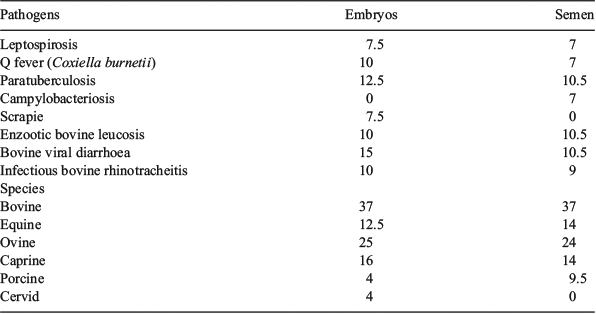107 RESEARCH PRIORITIES FOR SAFE SANITARY TRADE OF EMBRYO AND SEMEN
F. Fieni A , C. Grant A , J. Gard-Schnuelle A , G. Perry A , C. Wrenzycki A and P. Blondin AInternational Embryo Technology Society, Health and Scientific Advisory Committee
Reproduction, Fertility and Development 29(1) 161-162 https://doi.org/10.1071/RDv29n1Ab107
Published: 2 January 2017
Abstract
Embryo transfer and artificial insemination are utilised nationally and internationally for the introduction, improvement, and preservation of livestock genetics. Embryos present a lower risk of infectious disease transmission than do live animals. In order to maintain the sanitary security and to facilitate the trade of embryos and semen worldwide, the Health and Scientific Advisory Committee of the International Embryo Technology Society designed, developed, and conducted a survey to determine research priority. The survey questionnaire was sent to 32 government representatives and 76 embryo transfer and artificial insemination industry representatives around the world to countries where artificial breeding industries are active and well developed. A total of 16 answers were received, 9/32 (28%) from government representatives and 7/76 (9%) from industry representatives. The global feedback was 15%. The survey indicated that, in terms of research priority, embryos and semen were equally important. With regards to embryo research priorities, the survey results ranked in vitro-produced embryos research as the most important, followed by in vitro-derived embryos, and then oocytes. Apart from scrapie for embryos and Campylobacteriosis for semen, research priorities were similar for the major pathogens of embryos and semen, in particular, bovine viral diarrhoea and paratuberculosis (Johne’s disease; Table 1). Emerging or less common diseases were not forgotten. Other diseases suggested but not listed in Table 1 included bluetongue, foot and mouth disease, lentivirus, arbovirus, bovine tuberculosis, porcine epidemic diarrhoea, porcine reproductive and respiratory syndrome, African swine fever, and ovine pulmonary adenocarcinoma (Jaagsiekte). The survey highlighted the need to focus research largely on ruminant species (Table 1). Other issues identified by the survey included (i) alternative or indirect processes for determining the sanitary quality of in vitro-produced embryo as for in vitro-derived embryos, including standardized testing of discarded oocytes or testing culture media for pathogens with validated PCR techniques, (ii) safe sanitary techniques for the perforation of the zona pellucida for biopsy, for pre-implantation genetics and for diagnostic purposes, (iii) recommendations for international trade in embryos or semen originating from vaccinated donors, and (iv) use of biologicals for disinfecting embryos during washing procedures.

|


